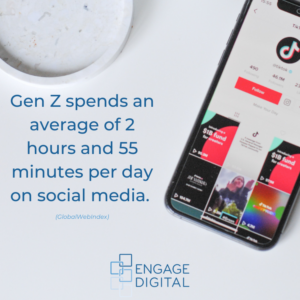As Generation Alpha is on the cusp of advertising relevance, marketing to Generation Z is still the dominant force in the marketplace. Gen Z, also known as Zoomers, is the largest and most diverse generation to date. Gen Z individuals were born between 1997 and 2012 and boast a population of over 2 billion worldwide. That’s a ton of potential consumers.
In a way, Gen Zers are an improvement on their predecessors: Millennials. Zoomers continued their education after high school, are racially and ethnically diverse, and are slightly more progressive, making these digital natives more cautious in their reception of marketing practices.
Because Zoomers grew up in a digital age, their reception to digital marketing is invaluable. Characterized by both their short attention spans and love of social media, Generation Z desires both authenticity and social responsibility from the brands they engage with. In comparison to traditional pComparedketing to the demographic cohort requires a different approach that is seeing widespread adaptation across the industry.
Value Comprehension
In a study conducted by Deloitte, climate change and environmental issues was the top concern for Generation Z. Consequently, Zoomers expect the brands they engage with to share these values, amongst other social issues. An estimated 69% of Gen Zers prefer buying from companies contributing to social causes. They are also more likely to engage with brands that have a purpose beyond just selling a product.
Because of this, a marketing strategy must go above and beyond promoting products. Instead, a company must prove how a brand is making a positive impact on the particulars that Gen Z finds a connection with — the polar opposite of Baby Boomers, who cared very little about contributions to a cause.
This could involve partnering with a nonprofit organization or implementing sustainable practices in your business to appease the demographic.
Leverage Social Media
Social media is an integral part of Gen Z’s lives, with 85% using Instagram and 79% using Snapchat. However, this demographic isn’t just passive consumers of social media; they are active participants who expect to engage with brands on social platforms. An estimated 44% of Gen Zers want to co-create products with brands on social media, while 37% want to participate in social media campaigns.
A brand must establish a strong presence on social media by publishing content that resonates with the demographic. Strategies could involve partnering in influencer marketing, creating short-form video content, or launching a social media campaign encouraging user-generated content.
Authenticity
Transparency and honesty are vital virtues for Gen Z; they can quickly detect when a brand is being disingenuous. According to a study by Cohn & Wolfe, 89% of Gen Zers believe that it is important for brands to be transparent about their values and practices.
To convey authenticity, brands must display the human side of their brand. Examples include: behind-the-scenes content or highlighting the people behind your brand.
Business practice transparency should also be emphasized, such as the supply chain process or the environmental impact caused by production and distribution.
Offer Personalized Experience
These consumers strive to be more than a number. Additionally, the brands that they support should comprehend their needs and preferences. An estimated 60% of Gen Zers are willing to share their personal data with brands if it leads to a more personalized experience.
To offer personalized experiences, brands need to leverage data to understand customers’ preferences and create targeted marketing campaigns. This could involve using artificial intelligence to recommend products based on their browsing history or creating personalized email campaigns.
Publish More Video Content
This demographic loves video content, with short-form as the most popular content type. A total of 95% of them said they use YouTube, and 50% said they watch more than an hour of online video per day. Publishing short-form daily easily consumed on social media platforms like Instagram and TikTok.
Platforms continue investing in highly consumable content, coinciding with our rapidly diminishing attention spans. Social media video lasting 7-60 seconds gets shared 1,200% more, contributing to the rise in the popularity of short-form videos, aka “reels.”. Videos are also highly shareable, which is essential for reaching the generation’s fleeting attention spans.
Incorporate Humor
Although viral memes and videos have been making the rounds on the internet since the mid-’90s, Generation Z was actually raised on this format of humor. They appreciate brands that can tap into the current pop culture. A total of 75% of Gen Zers claim humor is an important part of their lives.
Understanding the culture and sensibilities of Gen Z yields created content that is funny and relatable. Getting the tone right is absolutely critical; varying messages across different channels is appropriate, depending on the audience.
Entertain
Content isn’t going anywhere with Zoomers unless the produced content and information are entertaining. In other words, boring offerings will kill a marketing campaign before it even gets off the ground. Entertaining content can come in the form of short videos that are visually appealing, replete with overlays and poppy music. In the wake of so many new apps and creative filters, anything considered static or boring won’t stand a chance with this generation.
Interactive content can also encourage interest and conversation. It can also inspire new ideas for future content.






